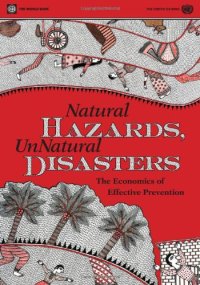
Ebook: Natural Hazards, UnNatural Disasters: The Economics of Effective Prevention
Author: World Bank
- Genre: Business
- Year: 2010
- Publisher: World Bank Publications
- Language: English
- pdf
''A remarkable combination of case studies, data on many scales, and application of economic principles.... [this report] provides a deep understanding of the relative roles of the market, government intervention, and social institutions in determining and improving both the prevention and the response to hazardous occurrences.'' Kenneth J. Arrow, Nobel Prize in Economics, 1972
''I strongly recommend this book to non-economists as well as economists, and to government officials who must cope with floods, oil spills, earthquakes, and other disasters.'' Gary S. Becker, Nobel Prize in Economics, 1992
''Fascinating and right on target.... You are doing very important work.'' Elinor Ostrom, Nobel Prize in Economics, 2009
''This report is a gem....a model to be studied and emulated....a team effort, contradicting the popular notion that a camel is a horse described by a committee. I don t remember reading any other 248 pages on a deadly serious subject that were so informative and so easily digested.'' Thomas C. Schelling, Nobel Prize in Economics, 2005
''An excellent piece of work with really practical lessons that will influence the way disasters are handled and indeed prevented.... [it] could make a gigantic difference to the lives of vulnerable people. I welcome it warmly.'' Amartya Sen, Nobel Prize in Economics, 1998
''Careful, thoughtful, studious... responses will be more effective, before and after the event, and damage will be less if governments, relief organizations, and others learn from this study.'' Robert M. Solow, Nobel Prize in Economics, 1987